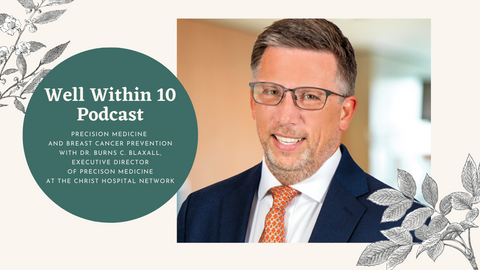
Precision Medicine & Breast Cancer Awareness – Transforming the Way We Prevent and Treat Breast Cancer

The American Cancer Society reports that “Breast cancer death rates declined 40% from 1989 to 2016 among women. The progress is attributed to improvements in early detection.
This month, in recognition of Breast Cancer Awareness, WISe is spotlighting innovation from the Precision Medicine group at The Christ Hospital Health Network and their work in transforming the way we prevent and treat breast cancer.
In the current medical system, things are designed to be reactive – we wait to go to the doctor until it’s almost too late. Treatments are given based on what works for the majority. The Precision Medicine group at The Christ Hospital is revolutionizing this approach by developing proactive care from the beginning and catering prevention plans and treatments to what works best for each individual’s unique genetic makeup.
The Christ Hospital Health Network, who’s primary campus sits just three miles north of downtown Cincinnati, Ohio in the historic neighborhood of Mt. Auburn, and with centers and physician practices across the Tristate, is home to some of the most innovative research and practices in early detection for cancer and other diseases. The Christ Hospital offers Precision Medicine and genetic testing for patients with cancer and people with a strong family history of cancer.
Rather than taking a one size fits all approach to healthcare, The Christ Hospital is tailoring preventative and proactive treatment plans specific to each individual. Thanks to advances in Precision Medicine, physicians are able to identify diseases in their early stages, making them far more treatable. The goal is to proactively identify an individual’s disease and disease risk, then develop the best possible early detection, prevention and treatment plans catered specifically to that person, to promote a long, healthy life.
What is Precision Medicine?
Precision Medicine, sometimes referred to as personalized medicine, has grown rapidly in recent years and is a “groundbreaking approach that matches patients with the treatment that will work best for them, based on their unique genetic make-up” (TheChristHospital.com/Precision-Medicine). This approach is two-fold. First, it is proactive in evaluating hereditary or genetic disease risk. Second, it leverages an individual’s genetics and diagnostics to develop prevention, detection and treatment plans that will provide the best outcome for that individual.

Is Precision Medicine accessible to me?
The Christ Hospital is working hard to provide the best care for the Cincinnati community. Currently, a genetic evaluation is FREE to any woman scheduled for a mammogram, or with a genetic counselor or high-risk cancer screening clinic within The Christ Hospital Health Network. The evaluation is now accessible through an at-home chatbot system called Gia (Genetic Information Assistant) that evaluates a patient’s risk for cancer and other diseases (even before you have any symptoms at all). Soon, The Christ Hospital hopes to provide the genetic evaluation to any Women’s Health patient, then ultimately to all Primary Care patients. (Stay tuned!)
What happens if my evaluation shows I’m at high-risk for cancer?
If, upon your evaluation, you are shown to have met guidelines for hereditary cancer testing or show a lifetime risk of breast cancer, you will meet with a genetic counselor and/or cancer specialist. Together with your physician, you’ll come up with an action plan to aid with prevention, early detection, and treatment plans catered specifically to your unique genetic makeup. If a patient is found to have an actionable mutation, any blood relative can be tested for FREE for the same variant.
Concerned about your cancer risk?
In a single visit to the High Risk Cancer Screening Clinic, you will meet with a Genetic Counselor and Advanced Practice Provider. They will advise you about:
- Your risk of developing specific types of cancer based on your family history
- Genetic tests that can give you more information about your risk for certain types of cancer
- The testing process and the limitations and accuracy of genetic tests
- Emotional, psychological, and social consequences of knowing the test results.
- Cancer screening, monitoring and prevention options
- Nutrition and lifestyle counseling for risk reduction focused on diet, weight loss, and exercise
- Diagnostic and treatment options
- The privacy of your genetic information
- Talking with family members about cancer risk
Some people are at a higher risk for cancer due to family history. If you answer "YES" to any of the questions below, you may qualify for an appointment in The Christ Hospital High Risk Screening Clinic to evaluate your personal cancer risk.
- Do you have at least one relative who was diagnosed with 1 of the following cancers before age 50: breast, colon, uterine?
- Do you have at least 1 relative who was diagnosed with one of the following cancers: ovarian, pancreatic, male breast, medullary thyroid?
- Do you have at least 3 relatives on one side of the family who were diagnosed with breast cancer?
- Do you have at least 3 relatives on one side of the family who were diagnosed with colon or uterine cancer?
- Do you have a relative in at least 3 generations in your family who were diagnosed with cancer?
- Do you have a relative who has been diagnosed with multiple primary cancers?
- Do you have Ashkenazi Jewish ancestry?
To schedule an appointment for genetic testing & Precision Medicine care, connect with The Christ Hospital ezCare Concierge here.
Learn more about genetic testing at The Christ Hospital and the benefits of Precision Medicine at TheChristHospital.com/Precision-Medicine

|
Did you know the Christ Hospital was pioneered in part by Isabella Thoburn, a teacher, nurse and missionary, out of a private home in Cincinnati’s West End. In 1893, James Gamble, whose prospering soap business eventually became the Procter & Gamble company, moved it to its current location in Mt. Auburn. In 1902, The Christ Hospital was the first hospital to allow a female physician to treat patients. (Learn more on the history of The Christ Hospital here.) |
Check out the WISe Well Within 10 podcast below!
In this episode, Stevi Carr, CEO of WISe Wellness Guild talks with Dr. Burns C. Blaxall, PhD about how his team at The Christ Hospital is revolutionizing the way we approach breast cancer prevention, detection and treatment.
Join us on Instagram at @wise_wellness_guild for daily inspiration, community spotlights and wellness resources. We'd love to hear from you!


Leave a comment